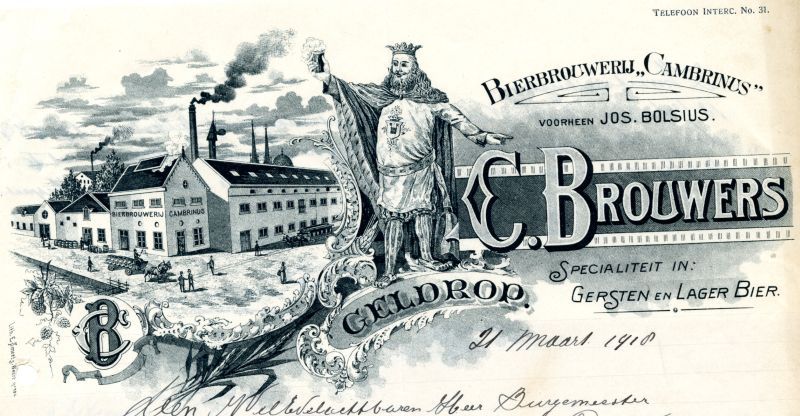Sneivelstrutje & JeDeWe
The Langstraat was known in the 19th century as the "Sneivelstrutje" (Jeneverstraatje), which says enough about the drinking at that time.
Het Machinaal
The linen weaving mill that was established in 1863 in Langstraat, and it was the first textile factory to be powered entirely by steam power. Here the looms were powered by a machine for the first time. The linen weaving mill, popularly known in Geldrop as 'Het Machinaal', was founded by Willem Vissers, a carpenter from Drunen, Jan Mathijs Eijcken, Antoon Stephanus Eijcken and De Booij from Den Bosch. In 1864 the factory site was expanded with the purchase of a plot of land from the Armbestuur between the factory and the Burght. In 1874 the company 'Vissers, Eijcken en De Booij' was dissolved, because A.S. Eijcken had died in a train accident. His widow continued the business together with Willem Vissers and Jan Mathijs Eijcken under the name Vissers en Eijcken.
The company closed in 1933. In 1940, the vacant buildings were bought by the N.V. Jansen de Wit stocking factory in Schijndel.
This was a spinning mill where the yarn for weaving was made. The Royal Hosiery and Sock Factory Jansen De Wit (JéDéWé or De Sok 1915-1985) originated near Eindhoven. The founder of the company was Martinus Jansen, a stocking maker by trade, who started a small machine hosiery in Tongelre around 1840.
Sneivelstrutje
Jansen de Wit's factory was located on Langstraat. Also called Sneivelstrutje (Juniper Street). Read the story about the Sneivelstrutje below.
In 1799, Stephanus Hanewinckel, who travelled through the Meierij, writes: "Geldrop would be a prosperous village if they put their affairs in better order, but the coffee and gin devour an enormous amount of time and money here.”

The Langstraat was known in the 19th century as the "Sneivelstrutje" (juniper street), which says enough about the drinking at that time. Around 1795 there were 2 gin distilleries, 3 breweries and no fewer than 20 inns and pubs in Geldrop and Zesgehuchten (which was then a separate municipality) out of a total population of 1850 inhabitants, 400 of which were men.
The 2 juniper distilleries, the "Roode Leeuw" and "De Keijser" were owned by Adriaan van den Heuvel (1721-1806). His son Wilhelmus Adrianus van den Heuvel (1764 - 1824) was a well-known beer brewer and his son Adrianus van den Heuvel (1794 - 1854) bought the Inn “De Zwaan” on the Grote Heuvel. This Adrianus, together with Hendrik Eijcken, also started manufacturing and selling woolen fabrics at that time. Adrianus later continued on his own, from which the A. van den Heuvel & Zn Wool Fabrics Factory originated. On the site of the 1863 factory in the Molenstraat (now the Weaving Museum) in the 18th century there was one inn right next to the watermill “Het Pannehuijs” and one on the corner of Heuvel / Wielstraat “De Wildeman”.
As mentioned before, many establishments at that time supported drinking. The manufacturers of that time were usually the ones who owned these inns.
Through gin, beer, woollen fabrics and the Van den Heuvel family, a Weaving Museum eventually emerged!